Related Research Articles

The albums discography of American country music artist Charley Pride contains 44 studio albums, three live albums, seven video albums, 36 compilation albums, three extended plays and 12 album appearances. Signing his first recording contract in 1966 with RCA Victor, he released his first album the same year called Country Charley Pride. The studio release peaked at number 16 on the Billboard country albums chart. It also sold 500,000 copies in the United States, helping it to receive a gold certification from the Recording Industry Association of America. In 1968, The Country Way topped the country albums chart and spent 42 weeks on the list. The record also certified gold. Pride continued releasing a series of studio albums in the 1960s. Both of his 1969 studio efforts would certify gold from the RIAA as well.

The singles discography of American country artist Dottie West contains 59 singles released as a solo artist, 12 singles released as a collaborative artist, 3 promotional singles and 1 other charting song. West signed with RCA Victor Records in 1963, having her first Top 40 hit the same year. It was followed in 1964 by "Love Is No Excuse", a duet with Jim Reeves that became West's first top 10 hit. In 1964, she also released "Here Comes My Baby". The song reached number 10 on the Billboard Hot Country Singles chart and became the first song by a female country artist to win a Grammy award. From her 1966 album, West issued four singles, including the top 10 hits "Would You Hold It Against Me" and "What's Come Over My Baby". Over the next two years she had major hits with "Paper Mansions", "Like a Fool", "Country Girl", and "Reno". In 1969, West collaborated with Don Gibson on "Rings of Gold", which reached number 2 on the Billboard country chart. In 1973, she released a single version of a commercial jingle originally used by The Coca-Cola Company. Entitled "Country Sunshine", the song became West's biggest hit, reaching number 2 on the country songs chart and number 49 on the Billboard Hot 100. The song also nominated her for her eleventh Grammy. After releasing the top 10 hit "Last Time I Saw Him" (1974), West's chart hits declined and she was dropped from RCA in 1976.

Greatest Hits is a compilation album released by American country music artist Sylvia. It was released in 1987 via RCA Records was produced by various individuals, including Tom Collins and Brent Maher. It was the last album released by Sylvia while she was recording for the RCA record label. It also spawned one single, which became a minor hit on the Billboard country chart.
"Missin' Mississippi" is a song written by Byron Gallimore, Blake Mevis and Bill Shore, and recorded by American country music artist Charley Pride. It was released in September 1984 as the third single from the album Power of Love. The song became a top 40 hit on the Billboard country chart.

The discography of American country music artist Charley Pride contains 75 singles, one other charting song, two promotional singles, one featured single and 11 music videos. Pride signed his first recording contract with RCA Victor in 1966. His first two singles failed to become hits. His third single, "Just Between You and Me," became a hit when it reached the top ten of the country charts. Pride had several more top ten hits over the next several years until he had first chart-topper in 1969. The single, "All I Have to Offer You ," reached number one on the Billboard Hot Country Songs chart and spent 17 weeks charting. This was followed by five more number one hits, including "Is Anybody Goin' to San Antone." All of these singles also reached low-end positions on the Billboard Hot 100.
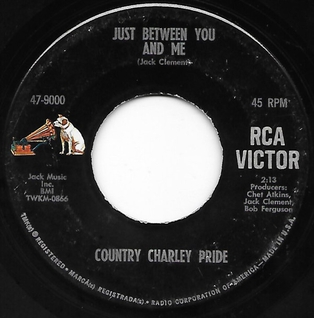
"Just Between You and Me" is a song written by Jack Clement, and recorded by American country music artist Charley Pride. It was released in September 1966 as the first single from the album Pride of Country Music. The song was Pride's third single and his first major hit as a recording artist.
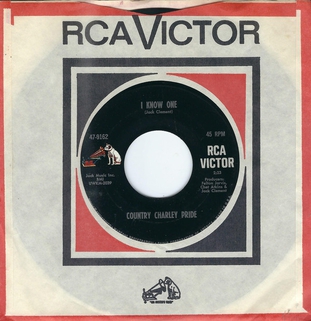
"I Know One" is a song written by Jack Clement, and recorded by American country music artist Charley Pride. It was released in March 1967 as the second single from the album Pride of Country Music. The song was Pride's fourth single and his second major hit as a recording artist.

"Does My Ring Hurt Your Finger" is a song written by Jerry Crutchfield and Don Robertson, and recorded by American country music artist Charley Pride. It was released in August 1967 as the first single from the album The Country Way. The song was Pride's fifth single and his third major hit as a recording artist.
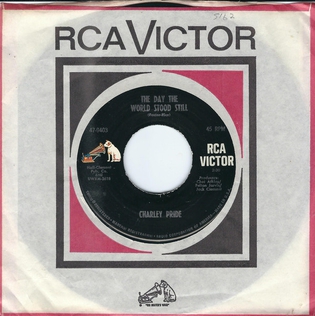
"The Day the World Stood Still" is a song written by Jerry Foster and Bill Rice, and recorded by American country music artist Charley Pride. It was released in December 1967 as the second single from the album The Country Way. The song was Pride's sixth single and his fourth major hit as a recording artist.

"The Easy Part's Over" is a song written by Jerry Foster and Bill Rice, and recorded by American country music artist Charley Pride. It was released in April 1968 as the first single from the album Songs of Pride...Charley That Is. The song was Pride's seventh single and his fifth major hit as a recording artist.

"Let the Chips Fall" is a song written by Jack Clement, and recorded by American country music artist Charley Pride. It was released in September 1968 as the first single from the album The Sensational Charley Pride. The song was Pride's eighth single and his sixth major hit as a recording artist.

"Let Me Live" is a song written by Ben Peters. It was originally recorded by American country music artist Charley Pride. The song was produced by Jack Clement and was released as a single via RCA Victor Records in 1971. The song became a top 40 hit on the Billboard country chart and in Canada. It was Pride's only gospel recording to become a major hit.
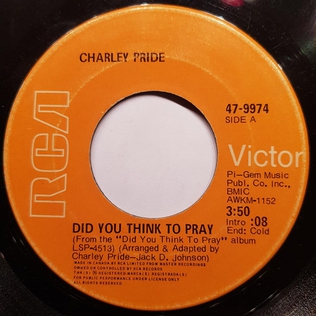
"Did You Think to Pray" Recorded by Charley Pride, the song was produced by Jack Clement and was released as a single via RCA Victor Records in 1971. Many sites credit Charley Pride with writing the song with assistance from Jack D. Johnson, but the lyrics were written by Mary A. Pepper Kidder and the tune by William O. Perkins. The song became a minor hit on the Billboard country chart. It was later released on album of the same name.

Charley is the twentieth studio album by American country music artist Charley Pride. It was released in May 1975 via RCA Victor Records and was produced by Jack Clement. The record was Pride's twentieth studio album released in his career and contained a total of ten tracks. The album included two singles which became major hits that year on the country chart: "I Ain't All Bad" and "Hope You're Feelin' Me ."

"Down on the Farm" is a song written by Eddie Setser, John Greenebaum and Troy Seals, and recorded by American country music artist Charley Pride. It was released in January 1985 as the first single from his Greatest Hits, Volume 2 compilation album. The song became a top 40 hit on the Billboard country chart.

"Amy's Eyes" is a song written by Terry Brown and Jaima Prater Hunt, and recorded by American country music artist Charley Pride. It was released in December 1989 as the third single from the album Moody Woman. The song became the final top 40 hit of Pride's career.

The Happiness of Having You is the twenty-first studio album by American country music artist Charley Pride. It was released in November 1975 via RCA Victor Records and was produced by Jerry Bradley. It was Pride's twenty first studio recording released in his music career and contained ten tracks. The album included two singles which became major hits on the country charts: "My Eyes Can Only See as Far as You" and the title track.

She's Just an Old Love Turned Memory is the twenty-third studio album by American country music artist Charley Pride. It was released in March 1977 via RCA Victor Records and contained ten tracks. The record was co-produced by Jerry Bradley and Pride. It was Pride's twenty third studio recording in his career and spawned three singles: "A Whole Lotta Things to Sing About", "I'll Be Leaving Alone", and the title track. The album received positive reviews from critics and music publications.
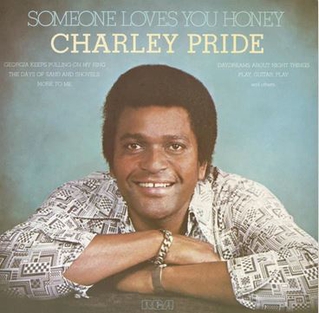
Someone Loves You Honey is the twenty-fourth studio album by American country music artist Charley Pride. It was released in February 1978 on RCA Victor and contained 11 tracks. The album was co-produced by Jerry Bradley and Pride. Two of Pride's major hits were included on the studio record: "More to Me" and the title track. Both songs became number one hits. The album itself would also reach charting positions following its release.

Greatest Hits, Volume 2 is a compilation album by American country music artist Charley Pride. It was released in May 1985 via RCA Records. The album includes the singles "Down on the Farm" and "Let a Little Love Come In".
References
- 1 2 3 "Greatest Hits, Vol. 2: Charley Pride: Songs, Reviews, Credits". Allmusic . Retrieved 31 December 2020.
- ↑ Vinopal, David. "Charley Pride: Biography & History". Allmusic . Retrieved 25 December 2020.
- ↑ Pride, Charley (May 1985). ""Let a Little Love Come In" (Vinyl Single Insert Information)". RCA Victor Records .
- 1 2 Whitburn, Joel (2008). Hot Country Songs 1944 to 2008. Record Research, Inc. ISBN 978-0-89820-177-2.
- ↑ ""Let a Little Love Come In" chart history". Billboard . Retrieved 26 December 2020.
- ↑ "Charley Pride -- "Let a Little Love Come In" (1985, Single)". Discogs . Retrieved 31 December 2020.
- ↑ "Charley Pride Chart History (Hot Country Songs)". Billboard. Retrieved December 31, 2020.